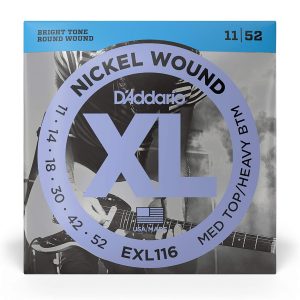
- Material – Nickel Steel
- Gauge – Med. Top/Hvy. Bottom (0.11-0.52)
- 6 Strings
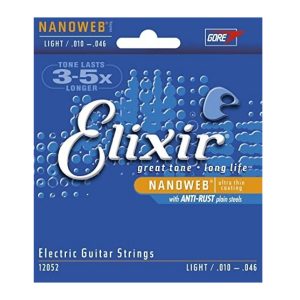
- Material – Nickel Plated Steel
- String Gauge – Light (.010 .013 .017 .026 .036 .046)
- 6 Strings
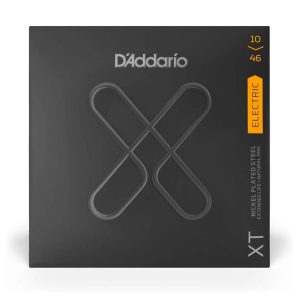
- Core Material – Steel
- Gauge – Super Light To Light Top/Hvy Bottom
- 6 Strings
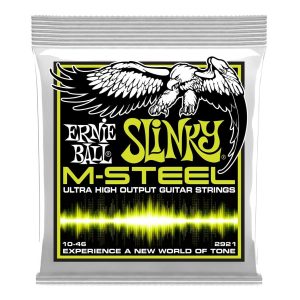
- Material – M-Steel
- Gauge – Regular Slinky (.010, .013, .017, .026, .036, .046)
- 6 Strings
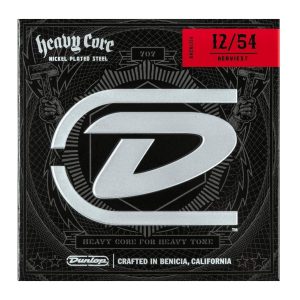
- Material – Nickel Steel
- String Gauge – Extra Heavy (.012–.054)
- 6 Strings
Choose the Best Guitar String for Metal
Customer’s Choice: the Best Rated Guitar Strings for Metal
17 users answered this survey. Please help us improve this review!
A guitar string is made of two strands (wires) that are twisted around each other. Each strand consists mostly of metal, but there are also different materials like nylon used for the strings on acoustic guitars.
Benefits of guitar strings for metal music
- The right sound;
- Strength and durability;
- Long-lasting;
- Smooth playing;
- Easy to play;
The best guitar strings for metal will provide you with the type of sound that is required to play this music style. They are also made from strong materials so they won’t snap or break quickly, which means you’ll get a long life out of them before having to replace them.
Do you play metal? If so, then the guitar strings that you use matter. Many guitarists are looking for a string that will provide them with an aggressive sound and feel. These are the best strings for metal that the metal music experts have found!
Experts wrote this guide to answer all of your questions about what type of strings work best for different genres. You can find reviews on each of these products, as well as helpful tips on how to select one based on your needs.
Table of Contents
D’Addario Nickel Wound Electric Guitar Strings – the Editor’s choice!
 D’Addario guitar strings are just the thing for a wide variety of guitars and styles. They produce excellent intonation, have corrosion-resistant packaging to maintain freshness in case you keep them for later use. These are the ideal set of strings for electric guitars with versatile ability due to the XL size available.
D’Addario guitar strings are just the thing for a wide variety of guitars and styles. They produce excellent intonation, have corrosion-resistant packaging to maintain freshness in case you keep them for later use. These are the ideal set of strings for electric guitars with versatile ability due to the XL size available.
Add a potent and bright-sounding string set to your arsenal with D’Addario. Delivering long-lasting, distinctive bright tones and excellent intonation, these strings will give you the perfect sound you’re looking for at an especially affordable price. What’s more, their corrosion-resistant packaging means that they’ll last even longer than most other strings.
These D’Addario strings are the world standard. It doesn’t matter what type of guitar you play, nickel wound electric guitar strings are durable and have a bright tone that makes it easy to hear every note.
Elixir Electric Guitar Strings with Polyweb – the best for the coating!
 Elixir electric guitar strings last longer than any other brand’s coated or uncoated strings, and provide hours of playing time for each string. How else can you fight corrosion? The patented coating technology protects against common oxidation that leads to unsightly tarnish, discoloration, corrosion, and degradation of the metal surface.
Elixir electric guitar strings last longer than any other brand’s coated or uncoated strings, and provide hours of playing time for each string. How else can you fight corrosion? The patented coating technology protects against common oxidation that leads to unsightly tarnish, discoloration, corrosion, and degradation of the metal surface.
These Elixir strings are rich with sound, crisp, and strong. It is soft on the fingers, smoother than uncoated strings, and it will keep up with you no matter what. All these Elixir strings come in standard light gauge: .010 .013 .017 .026 .036 and 46 so whether you are gigging or occasional playing we got you covered!
Elixir Electric Guitar Strings with Polyweb coating provide a crisp and robust tone to your guitars. The uniquely designed poly weave coating prolongs the strings’ life and tones, keeping them from getting in the way of playing. Elixir is always looking for ways to produce good-quality strings such as this.
D’Addario XT Nickel-Plated Steel Electric Guitar Strings – the best for durability!
 The D’Addario XT Nickel-Plated Steel Electric Guitar Strings will engage you like nothing else while lasting at least 4 times longer. With these strings, you too can rock out with all the awesome styles that exist in the real music industry.
The D’Addario XT Nickel-Plated Steel Electric Guitar Strings will engage you like nothing else while lasting at least 4 times longer. With these strings, you too can rock out with all the awesome styles that exist in the real music industry.
These string sets come with extended lifespan treatment on every single set of strings (131% better than traditional plated steel), meaning they will stay in tune like nobody’s business.
These high carbon steel wire and Fusion twist technologies deliver unparalleled tuning stability and break resistance while maintaining a bright sound with all-day playability and brightness for any gig.
Ernie Ball M-Steel Regular Slinky Guitar Strings – the best for the powerful response!
 Ernie Ball M-Steel Regular Slinky Guitar Strings are the superior magnetic attraction strings, excellent for expressive guitar playing and full guitar sound. Made in California with the finest and freshest materials, these strings express a rich and fuller tone with a powerful low-end response that can’t be matched by any other brand on the market.
Ernie Ball M-Steel Regular Slinky Guitar Strings are the superior magnetic attraction strings, excellent for expressive guitar playing and full guitar sound. Made in California with the finest and freshest materials, these strings express a rich and fuller tone with a powerful low-end response that can’t be matched by any other brand on the market.
With Element Shield packaging to prolong string life and keep them as fresh as they were when first made, these guitar strings offer an affordable way to upgrade your instrument while adding dimension to your sound.
Ernie Ball M-Steel strings are the perfect choice for players looking to take their tone to the next level. From blues chops that will wail with just a touch of dirt, to harmonic notes that ring uncanny thanks to these highly versatile and responsive strings, you’ll sound like an entirely new musician when you make the switch over to Ernie Ball string.
Dunlop DHCN1254 Heavy Core Nickel Wound Guitar Strings – the best for beginners!
 Dunlop Heavy Core strings are made for blues, metal, or anything else that requires heavier gauge strings. They are designed especially for dropped tunings so they don’t buckle at higher tensions, meaning more sustain on these Dunlops than any other string.
Dunlop Heavy Core strings are made for blues, metal, or anything else that requires heavier gauge strings. They are designed especially for dropped tunings so they don’t buckle at higher tensions, meaning more sustain on these Dunlops than any other string.
These strings will take you there with a quick attack, smooth feel, and defined low end. With the light top and heavy bottom, these strings are ideal for dropped tunings as well as beginners who don’t want to go through the hassle of changing their guitar’s way of tuning. Made from nickel-plated steel winding material that makes it one of the best strings for metal
Dunlop DHCN1254 Heavy Core Nickel Wound Guitar Strings are the best strings for metal. Thrown out your old set of medium-gauge strings and get ready to shred like never before with these heavy core, nickel wound “epicness”. It’s quite an upgrade if you’re not used to playing with softer strings; but once you play them, it will be hard to go back!
The Buyer’s Guide
Main Features:
- Strings Gauge
Guitar strings are made of metal and come in different thicknesses referred to as the “gauge” or “weight”. The gauge, typically measured by the diameter of a string’s round cross-section, is usually printed on the guitar string.
Guitars with higher numbers require thicker strings because they have longer vibrating lengths than guitars with lower numbers. For example, an electric guitar set for light-gauges has thinner wire wrapped around its core compared to medium- or heavy-gauge sets.
Guitarists who play heavier music tend to prefer mediums since they offer more flexibility; whereas lighter gauged players will function well with extra lights if their playing style calls for it (i.e., fast soloing).
The most common types of gauges for guitar strings:
Light Gauge
There are many different gauges of guitar strings, but the most common is a light gauge. Light-gauge guitar strings make it easier to bend notes and play fast runs with less effort than medium or heavy-gauge strings would require. However, this ease of playing comes at a price: The string tension on these lighter sets is also much lower (which means that you may have trouble staying in tune). For this reason, many guitarists opt for heavier gauges.
Of course, this does make it more difficult to play fast runs and bend notes. If you are looking for an easier feel but still want the tone of a heavier set (for example, if you like how metal music sounds), choose light-gauge strings with thicker core wire gauges; they will be much harder to break than lighter sets with thin string cores.
Heavy Gauge
Heavy-gauge strings are more difficult to fret and bend because the tension is so much greater than light-gauge strings (and even medium gauge), but they’re also less likely to go out of tune while you’re playing them. If you like to play with a lot of string bends or high solos that require some extra power behind them, then heavy-gauge strings may be your best bet.
It’s also worth noting that while two sets of heavy-gauge strings (for example, .009 and .012) will sound nearly identical to each other when played open on an electric guitar, they can produce slightly different sounds if you’re playing acoustic. The thicker the string gauge is, generally the more bass response it’ll have – which means that a set of medium-gauge strings (.011-.052) may be just what you need for your acoustic.
For any instrument with lower tuning than standard EADGBE (such as drop tunings), there’s even less tension in the strings so both light and heavy gauges become less necessary without sacrificing too much tone or playability. If you do choose to use light-gauge strings on a guitar tuned lower than standard, make sure to tune your instrument with care and check often that they haven’t gone out of tune (especially if you use the tremolo system).
Metal musicians most commonly use heavy-gauge strings. Heavy-gauge strings are more difficult to fret and bend because the tension is so much greater than light-gauge strings (and even medium gauge), but they’re also less likely to go out of tune while you’re playing them.
Medium Gauge
This type of string is considered to be good for the heavy stuff is medium gauge guitar string. They will not break easily and make it easy for you when playing your electric guitar in a faster motion. The sound produced by these strings can also give audio like no other, allowing you to play at full volume without experiencing any issues whatsoever.
If you are more of a beginner, however, medium gauge guitar strings may not be your best choice. It is better to go with light or extra-light for the first few months before transitioning into heavy metal guitar string types later on.
Many hard rock and metal players prefer the medium gauge of guitar strings. Their tone is neither too bright nor too dark – just right for that growling distortion sound without being overly obnoxious or muddy sounding. The brighter tone contributes to their characteristic crunchy, cutting sound when distorted.
- Size
Guitar strings come in a variety of different sizes. The most common guitar string size is .09 inches (or sometimes referred to as “heavy”). This is the most common size of guitar string used because it provides a nice balance between having enough tension (or pressure) on the neck and fingerboard, while still maintaining comfort for playing. This is also one of the most popular sizes for bass players to use as well, although slightly smaller gauges are sometimes preferred by some people.
These strings tend to provide more weight that helps with tone production due to their ability to create lower pitches than lighter gauge strings.
If you’re looking for an easy way to remember what each different sized string feels like when strummed or plucked together, here is how:
- .09 inches – this size will give you good playability but tends not to have much resistance in the strings;
- .11 inches – this size is similar to a regular pick, but has some playability and doesn’t produce much resistance at all in your hands when playing it;
- .14 inches and up (for standard guitar tuning) – these tend to be very heavy gauge strings that give you more tension with each pluck or strum, which can help create lower notes than lighter gauges will allow for. This is also the most common choice of string thickness among bass players who require thicker strings due to their long necks requiring more weight on them so they don’t “dive bomb” out of tune during performance. These are sometimes referred to as “power” type picks because they tend to provide so much tension and power.
- .12 inches – this size is a great option for people who want something in between the lighter gauge of .09 and the heavier gauges of more than .14, but still provides enough resistance that it’s not too difficult on your fingers or hands when playing;
Other things to remember about the gauge/size of guitar strings
The most important factor in choosing the best guitar strings for metal is gauge. This refers to how thick or thin a string is and it’s measured by the millimeter width of each steel wire in an individual string. The higher the number, typically between .010-.052 inches, the thicker/thicker they are which produces more volume when strummed hard while also being able to handle playing lower notes easier without sounding too floppy.
On the other hand, thinner gauges usually begin at .009 inches that are normally used on acoustics guitars because these have less tension than their electric counterparts making them gentler on fingers during practice sessions before shows where you want your tone as loud as possible but with no buzzing noise from loose strings.
With this knowledge in mind, the best guitar strings for metal are medium gauges around .010-.046 inches because they can handle lower tunings while providing a bright tone with great sustain which works well when playing riffs and chords over heavy drumbeats with distortion pedals that boosts their volume even more.
The only downside is that these types of strings are harder on fingers during practice sessions or if you’re not used to heavier gauge steel-string guitars so it’s important to wear gloves when practicing before shows where your hands will be covered in sweat anyway from jumping off amps and running across stages at sweaty clubs all night long.
For players who want an easier time sliding up and down scales without too much resistance, the best guitar strings for metal with a lighter gauge of .009-.04 inches are ideal. These types of strings are easier to play and good for beginners because they’re not as loud on stage but it can cause problems if you want your tone to stand out over the mix while playing in lower tunings.
For this reason, most experienced players prefer medium gauges that handle heavy-duty riffs and chords without too much resistance making them faster when changing scales or jumping from note-to-note quickly during solos where every second counts before an audience get bored waiting around and start heckling instead of cheering your greatness so get used to these steel-string guitars now.
- Length
The scale length will determine how much tension you need for certain gauges and materials, which ultimately affects their longevity as well as playability (especially with bends). It’s best to lengthen or shorten a string so that it’s slightly different from an adjacent one – this lessens the chance of buzzing, fretting out, etc., but also contributes to tuning stability by minimizing torque.
It’s also important to remember that the longer a string is, the lower its tuning will be.
For example, if you tune your low E down two whole steps (from standard E) and then use an extra-heavy pick with sharp edges for playing heavily distorted power chords in drop D tuning—the result might sound like mud because of how much shorter it is than usual.
To avoid this problem on bass guitars, many players prefer to shorten their strings by one or two semitones. Others insist they can hear no difference between them at all when tuned up fully or even higher.
The scales of electric six-strings vary from:
- 25 inches (a Gibson SG Custom);
- 27 inches (many Stratocasters);
- 28 inches (the Fender Telecaster Custom);
- 30 inches (a Gibson Les Paul Standard);
They are designed to accommodate standard tuning.
- Materials:
Steel
Steel-string guitar strings are the most common type of electric and acoustic guitar strings. They’re made from steel, which is what gives them their bright sound that cuts through any mix. This makes these types of strings popular among all genres including country-western to metal where they can be played in different tunings depending on the player’s desired tone.
Steel strings are known for their strength, which is why they are often used on electric guitars with high output pickups. Players who use guitar amps under the gain threshold can get away with using lighter gauges while others may need to go up a few sizes before being able to achieve the desired tone.
Nickel
Nickel is preferred over steel because it is smoother and produces a better tone when fretting notes at high positions. Other popular metals used to make electric guitar strings are stainless steel, cobalt, titanium, or pure tungsten without any alloy in them.
While they all deliver excellent performance under different gauge configurations (thickness), their cost ranges anywhere from $12 to $35 per set. Nickel does not corrode as some other string materials do; this makes them last longer than others while maintaining optimum sound quality for playing lead riffs.
Nickel-Plated
If you are looking for the most affordable option, nickel-plated strings can be a good choice. They’re notably cheaper than stainless steel and other alloy options (like phosphor), but, still, deliver plenty of power to get your electric guitar roaring. Compared to pure nickel, they have lower resistance on average which means that it takes less effort to push them into their magnetic field, resulting in more output due to increased efficiency.
Nickel plating also helps prevent corrosion that is important if you live somewhere humid or go swimming often with your instrument! Because they are magnetic, nickel-plated strings also have a slightly longer sustain which is great for metal music.
Some of the best nickel-plated strings are made by D’Addario. They have a wide range of gauges available, from extra light to heavy/extra heavy for different players and guitars.
Bronze
Bronze strings are by far the most popular option for metal guitarists. They provide a great balance between bass response and treble attack, which makes them perfect for low tunings.
Bronze alloy is typically made up of 80% copper and 20% zinc with trace amounts of other metals added in to increase both durability and conductivity. Furthermore, bronze has excellent corrosion resistance properties making it one of the best choices for string-wound guitars where moisture can be an issue if you live near water or humidity levels are high outside.
Bronze strings have a bright and clear tone with excellent projection. Also, they are fairly easy on the fingers which makes them perfect for those long practice sessions where you might need to play your guitar more than just a few times per week.
Brass
Brass strings are very similar to electric guitar strings, so they will produce a bright tone. They have the advantage of being less sharp than steel when bent and do not corrode or lose their color after prolonged use. However, because brass is softer than other metals used in string manufacturing it tends to wear down faster resulting in frequent restringing.
The sound produced by brass can be described as more aggressive due to its bright overtones that actually work well with harder genres such as metal. Brass also has better acoustic qualities compared to other materials that are commonly used for making musical instruments including plastic and nylon since it produces warmer tones across all frequencies on an unplugged instrument.
Nylon
Nylon strings are standard for classical guitars. They have a mellower tone, but the lower sound clarity makes them ideal for fingerpicking styles. Nylon stringed instruments can be played without amplification too which is great if you don’t want to bother with pick-ups or pedals on stage. Nylon strings are more sensitive to humidity changes so keep this in mind when taking care of your instrument.
Some brands use metal wounds into their nylon monofilaments for added durability but other companies will simply wrap it with an outer coating instead. If you’re looking for something extra durable then the latter types might be what you need as they won’t break nearly as often during live performances or extended practice sessions. The downside to these tougher products, however, is that they don’t hold their tone very long before needing to be replaced either though even cheap classical guitar strings should last several years.
Nylon strings are not for everyone though. They’re more fragile than other types of guitar strings and their tone takes some getting used to if you’ve never played on nylon before. You’ll probably need a lighter touch when playing or else the string will rattle against the frets which can be annoying during quiet passages but classical guitars are often tuned low enough that this doesn’t happen very often.
Again, these complaints about nylon strings aren’t universal so check out what different players have said online to get an idea of whether or not they would work well with your own playing style too.
- Strings Core Metal:
Stainless Steel
Stainless steel is an alloy of iron and chromium. Steel makes up most guitar strings, but the addition of chromium results in stainless-steel metal strings. Stainless steels are more expensive than nickel or other alloys because they last longer and sound better due to their higher durability (and resistance) to corrosion.
The stainless steel core provides a nice balance between brightness and darkness without sacrificing too much clarity or sustain. The reason why this material works best for metal is that it’s really durable, so even if you break one string during live performances, there are four others that can keep your performance going strong.
Titanium
The titanium core strings are the first pick for many metal guitarists. They’re known to be durable and won’t break as easily as other metals, such as steel. However, they can sound a bit “tinny” on some amps because of their high-pitched tone that is why many people prefer stainless or nickel alloy.
While these types of alloys may not last quite as long (especially if you play every day), they do offer a more balanced and versatile sound that will work with any amp in almost any setting!
Cobalt
Cobalt is the ultimate choice when it comes to classic rock and metal guitar strings. They offer a distinct crisp tone that cuts through any mix but also manages to give your notes some warmth and body. These high-quality nickel wound electric guitar strings set with cobalt are available in both light (0.010–0.046) and medium gauges (0.012– 0.052).
As such they’re perfect for all sorts of performances from soft bluesy solos over heavy rhythms down to fast shredding leads without a problem at all—and this includes drop tuning as these can handle lower tunings up ‘til one full step below standard pitch! The only drawback here might be that they’re a little bit pricier than your conventional strings—but the difference in tone and playability is well worth it.
Some strings often have steel hex cores wrapped in a cobalt alloy, which give them their bright tone and feel while reducing the wear on your frets. This makes them perfect for metal guitar players who want to maintain clarity from the note–to–note without having to replace their strings as frequently (which is great if you don’t enjoy changing out your guitar set at all). The best thing about these types of strings is they will not alter the sound or playability of any other type of guitar you may own either!
Chrome
Chrome core strings are the perfect choice for guitar players who want to push their playing. They have a high output that allows you to get more volume out of your amplifier while retaining clarity and punch, so they’re great for fast double stops or complex chords that require lots of definition.
The availability of gauges from 0.008 to 0.046 makes them accessible to everyone making it easy to fit perfectly on any electric or acoustic guitar with standard tuners (check if yours can handle thicker gauges). If you want quality without sacrificing too much versatility then these will be one of your best choices when looking for new strings!
Copper
Copper has been used in string making since ancient times and offers a softer touch than steel. It also gives your tone warmth and fullness without sacrificing clarity or damping notes with excessive sustain. Besides offering excellent tone quality, copper is also an affordable option that tends not to go out of tune as quickly as stainless steel strings do when they get hot from extensive play sessions at high volumes.
It is an affordable option that doesn’t go out of tune as quickly as stainless-steel strings do when they get hot from extensive play sessions at high volumes.
- The most popular string winding patterns:
Round-wound
Other names for this type of winding pattern are double-round, flat round- and ground-wound. This is the most common pick-up winding mode because it’s easy to produce and provides a bright tone that accentuates high frequencies in overtones. The strings also feel smooth under fingers which makes them great for rhythm playing and fast solos as well as low tunings with thick gauges.
However, these strings sound very bright no matter what tuning they’re used on so you need to consider your amplifier settings if you plan on using heavier gauge string sets like .013-.05X or thicker (medium bottom-heavy). Some people prefer warmer sounds such as those produced by half-wound strings so keep that in mind as well.
Half-wound/Ground-wound half-round
The winding pattern is exactly like a round-wound, but the core wire used for the winding has been ground down and polished to remove sharp edges and burrs after being formed into shape. This makes it possible to create a smooth surface on the strings while still having a bright tone produced by steel alloy wrap over annealed (soft) high carbon steel cores.
These are great general-purpose string sets because they’re not as bright as traditional round-wounds and also feel smoother under fingers which helps with fast solos or lower tunings. However, this type of design does produce more volume output than regular round-wounds so you need to consider your amp settings if you plan on using them in high gain or metal genres.
Half-round/Ground-wound half-flat
This is the most popular type of electric guitar string winding pattern because it has a smooth surface under fingers, provides a bright tone, and feels comfortable to play even with thicker gauges (medium bottom-heavy).
However, this winding mode does not produce as much volume output as Round Wound strings do which means that players who are looking for brighter tones will have their ears blown off when they use these types of strings at louder volumes. They also can feel stiffer/rougher than other modes making them less suitable for fast techniques like legato soloing.
Flat-wound/Ground-wound flat-round
This is the most popular type of electric bass string winding pattern because it offers a smooth surface under fingers, produces warm tones, and feels comfortable to play even with thicker gauges.
The strings also feel soft for a long time that makes them great for fast techniques like legato soloing as well as lower tunings (medium bottom-heavy).
However, this winding mode does not produce much volume output so you need to consider your amp settings if you plan to use heavier gauge sets or high gain/metal genres. This mode can also feel stiffer than other types making it less suitable for fast licks and solos.
Guitar Strings Care and Maintenance
The first thing you should do when buying new strings is to take care of them. You want your guitar strings to last as long as possible, and if you don’t know how to properly take care of your guitar strings, they won’t be around for very long:
- When you first get a new set of strings, make sure to put them on your guitar and tune it. Once they’re tuned up, take them off the guitar and let them “rest” for at least 24 hours before putting them back on again. Doing this will help reduce string tension thus prolonging their lifespan;
- If you play metal music or other genres that require heavy distortion then there’s no need to worry about deadening your strings since any genre/sound requires some form of dampening (unless if you’re playing acoustic). However, if you do want to keep your sound bright and crisp while still maintaining proper tone and sustain then definitely consider buying an accessory like Doctor Stringfellow Guitar Polish Spray that will add a layer of wax to your strings when you play;
- Do not expose your guitar strings to extreme temperatures when storing them in the case or bag that comes with them. For example, if you’re going away on vacation for a week and leaving them in storage then make sure they are stored in an area where there is a steady temperature so as not to damage the integrity of the string;
- When changing out old/worn-out guitar strings always buy new sets from reputable brands like Ernie Ball or D’Addario since cheaper ones will wear down much faster than their pricier counterparts that cost $100+ will. A good set will last around two months maximum depending on how frequently you play (if playing daily) but if you play just once or twice a week then they will last longer;
- Make sure to change your guitar strings at least every month, otherwise, it might sound lifeless and dull due to the sweat that has built up over time. If this happens, simply wipe them with a dry cloth before inserting them back into the bridge of your guitar;
- Never clean with any strong chemical (paint thinner or acetone). This is especially important with coated guitar strings that protect against corrosion and finger sweat. Don’t remove the coating unless you want all tone gone from your instrument;
- Every week or so give each string a gentle stretch when tuning it back up after playing – do not over-tighten at first tuning;
- Store guitar strings in a cool, dry place away from moisture and humidity;
- Don’t cut off the ball end of your strings if you want to reuse them! Instead, save it with pliers or use another string as a replacement. This way is better for both environment and budget because cutting the ends only once per instrument instead of every time you replace a string saves lots of waste on parts that would be better used elsewhere at no extra cost;
FAQ
What gauge strings do metal players use?
In general, metal music players use heavy-gauge strings. This is because metal requires a powerful sound and thick string gauges help to achieve that goal. In fact, some guitarists actually prefer lighter gauge strings for other genres as they can provide better playability and speed when playing fast riffs. But the key here is choosing suitable types of strings for your preferred music genre whether you are a rocker or a “metalhead”!
What strings does Metallica use?
Kirk Hammett of Metallica is a long-time user of heavy-gauge Ernie Ball strings. James Hetfield also makes use of Ernie Ball 2220 Power Slinky strings.
Which Elixir string is best for metal?
Elixir strings are designed to have a long lifespan. They also reduce string noise and produce more volume. Elixir’s coated electric guitar strings provide the same tone, feel, and sound like an uncoated set of strings but with increased tuning stability. If you play for hours on end without needing to tune your guitar often, then these are the best option for metal playing.
Do Elixir strings sound better?
Elixir strings are mostly made of nickel-plated steel, which is designed to give their sound additional brilliance. However, the metal also makes them more susceptible to corrosion and tarnishing than other types of strings. If you’re looking for a specific tone rather than just enhanced durability, stainless steel or titanium alloy might be better suited for your style; especially if you play outdoors frequently.
How long should Elixir strings last?
With the coating on Elixir strings, you get a lot more life out of them. They are known to last up to five times longer than regular guitar strings so if your band practices every day or plays gigs often, they should hold up just fine for you. You can expect that these will easily last through any tour and then some!
Are D’Addario strings good?
Yes, D’Addario strings are great for metal. They have a distinctive bright tone and the high-end is nice and crisp while remaining well defined in relation to their low end. Their mid-range is clear and smooth, making them a very versatile string set. D’Addario strings are also quite durable with good tone retention qualities.
Useful Video: What Guitar Strings Are Right For You?
Final thoughts
If you’re looking for a string that will provide an aggressive sound and feel, the best strings for metal are in this guide. You can find reviews on each of these products, as well as helpful tips on how to select one based on your needs.
Stop playing guessing games with which strings will work well for your needs. Instead, take advantage of these reviews and tips! Hopefully, by reading this guide, you’ve found what works best for you and we wish you nothing but success in all future performances!


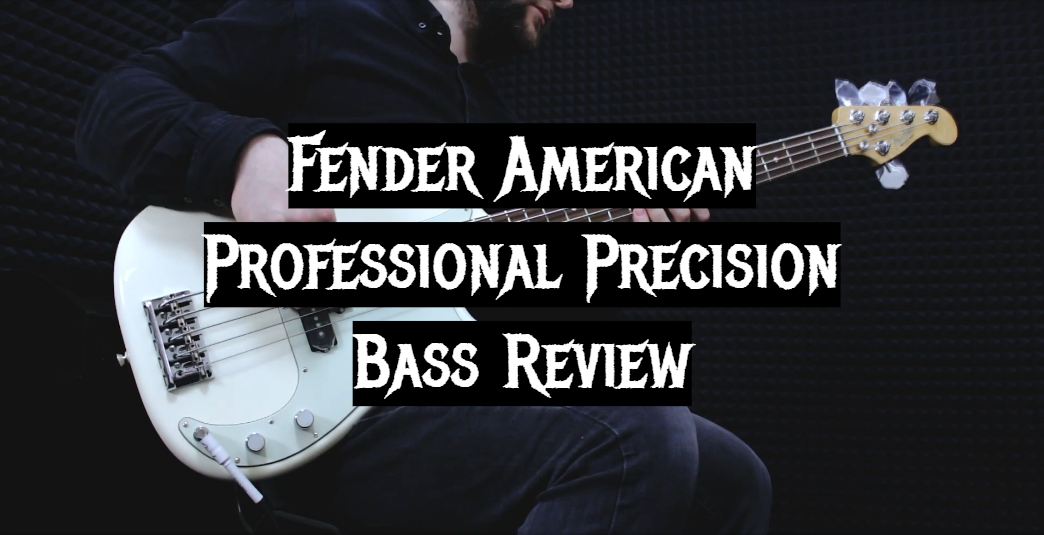

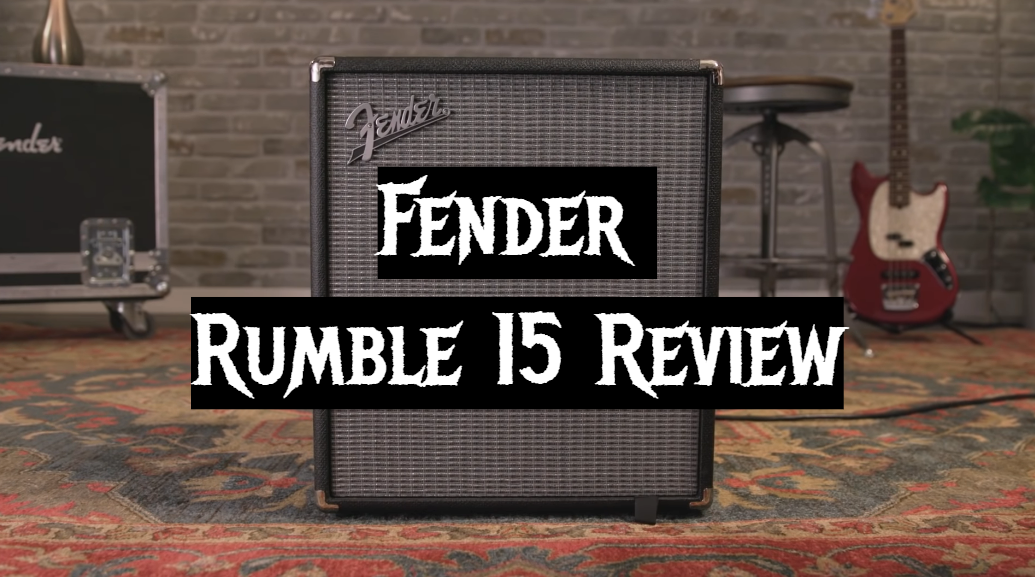
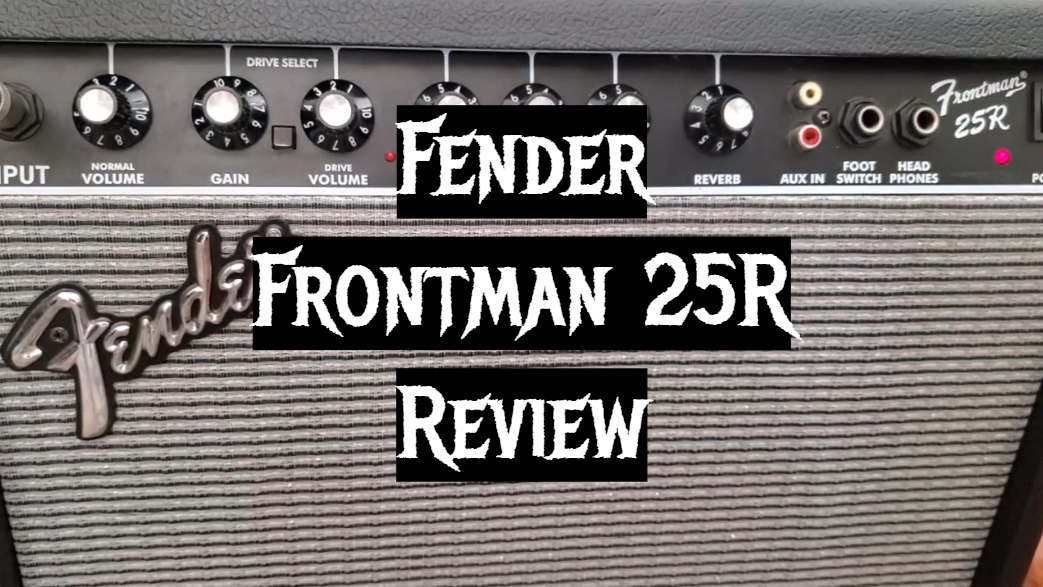
Leave a Reply